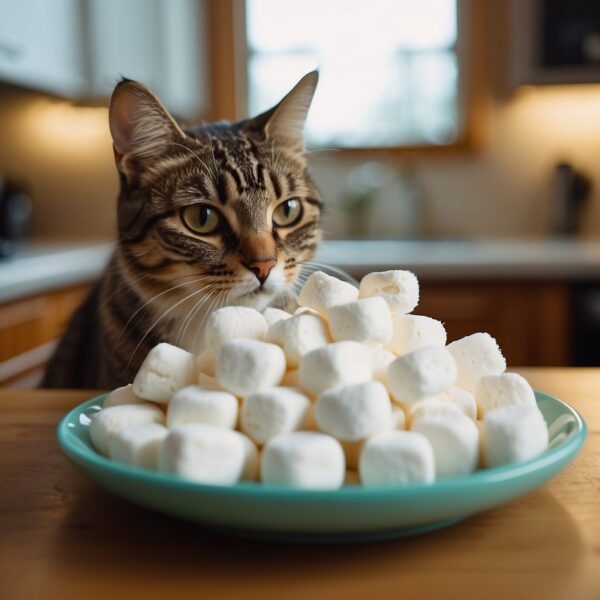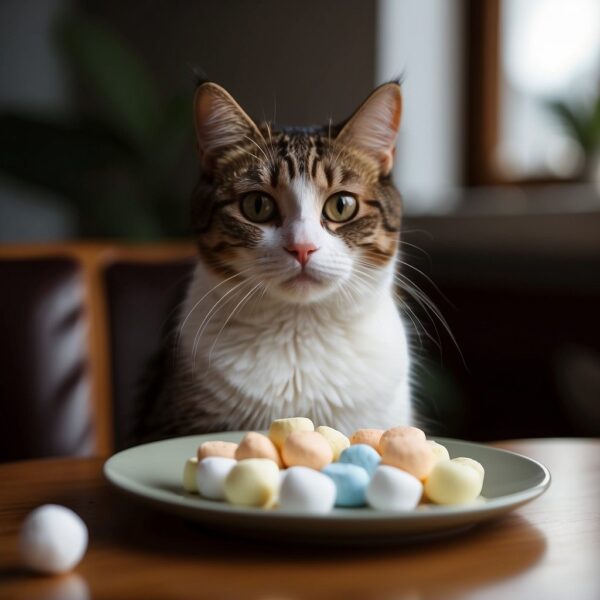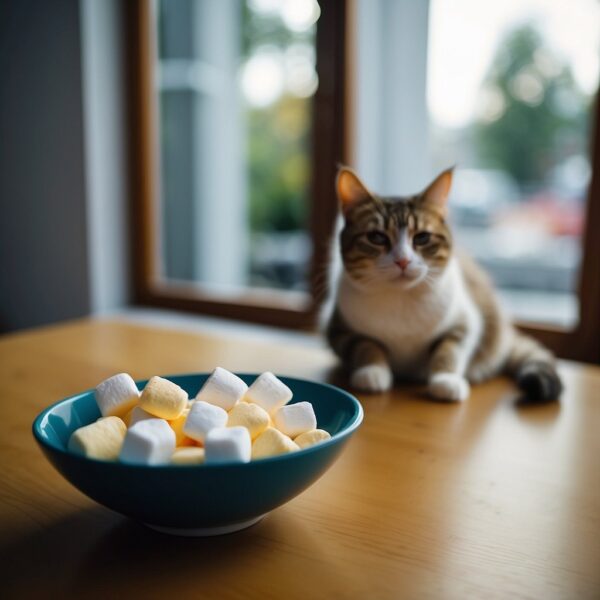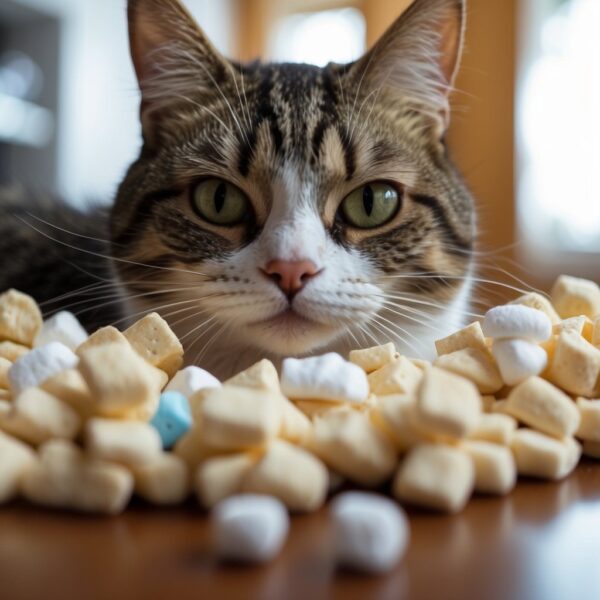
Cats And Marshmallows: Not a Cat Treat
Cat parents may wonder about the safety of feeding various human foods to their cats. One particular treat that might raise this question is marshmallows, a popular sugary snack among people. While these fluffy confections are not inherently toxic to cats, they are far from an ideal treat for them. Cats can eat marshmallows due to their non-toxic status, but marshmallows offer no nutritional value to cats and are laden with sugar and other ingredients that do not align with cats’ dietary needs.
Cats have specific nutritional requirements that are significantly different from those of humans. As obligate carnivores, their diet should be primarily composed of proteins and fats from animal sources, with very limited to no carbohydrate content. Offering marshmallows to cats can not only lead to a lack of essential nutrients but also pose potential health risks, such as obesity, diabetes, and dental problems. Moreover, due to their size and texture, marshmallows could become a choking hazard or cause digestive blockages in cats.
Key Takeaways
- Marshmallows are not toxic to cats, but they lack nutritional benefits and do not fit into a cat’s dietary needs.
- Feeding cats marshmallows can lead to health issues like obesity, diabetes, and dental problems.
- Marshmallows could present a choking hazard or cause digestive blockages in cats.
Can Cats Eat Marshmallows?
When examining whether cats can eat marshmallows, it’s crucial to understand both the nutritional profile of marshmallows and the potential health risks they pose to felines.
Marshmallows and Nutrition
Marshmallows provide no essential nutrients beneficial to a cat’s diet. Typically, they are composed of sugars and carbohydrates, offering empty calories without the necessary vitamins or minerals a cat needs.
cats and marshmallows Potential Health Risks
Feeding marshmallows to cats can lead to various health issues due to their high sugar and sodium content. Excessive sugar intake can increase the risk of diabetes and disrupt normal blood sugar levels, potentially leading to low blood sugar or hyperglycemia.
Toxic Substances in Marshmallows
Some marshmallows could contain toxic ingredients to cats, such as chocolate or xylitol, an artificial sweetener. It’s imperative to assess the ingredients as even small amounts of these substances can be harmful.
cats eating marshmallows: Physical Dangers and Choking
The texture of marshmallows poses a choking risk to cats. Their sticky and gooey consistency can cause obstruction in a cat’s throat or digestive system, leading to a potential choking hazard.
Sugar’s Impact on Cats eating marshmallows
A cat’s diet excessively high in sugar can lead to obesity and other associated health complications. Cats derive their energy from protein, and sugary treats like marshmallows do not provide the sustained energy they require.

Understanding Feline Nutrition
When it comes to the nutritional needs of cats, it’s essential to understand that they are obligate carnivores requiring a diet rich in animal-based protein. This section will detail the specific dietary needs of cats and the potential risks associated with feeding them human foods.
Carnivore Requirements
Cats are classified as obligate carnivores, meaning their diet must be primarily based on meat to fulfill their nutritional needs. Unlike omnivores or herbivores, cats lack certain enzymes necessary for the digestion of plant-based nutrients, emphasizing the necessity for animal-based protein. Protein provides the amino acids cats need for health and vitality, including taurine, which is crucial for heart health and vision.
Nutritional Needs and Health
The health of a cat is deeply influenced by its diet. Proper nutrition includes a balance of lean proteins like chicken and fish, fats, vitamins, and minerals. A deficiency in essential nutrients can lead to conditions such as heart disease or feline obesity. Adequate hydration is also vital, as water aids in digestion and prevents dehydration.
Risks of Human Foods
Although it might be tempting to share human snacks with feline companions, many common human foods can pose serious health risks to cats. Ingredients like chocolate, garlic, onion, and xylitol can be toxic to cats, causing symptoms from gastrointestinal upset to more severe conditions like anemia or xylitol toxicity. Human foods are often high in sugar and fat, leading to obesity and associated health issues such as diabetes and osteoarthritis.
Safe Treat Alternatives
For cat owners looking for safe treat alternatives, there are numerous healthier options that align with feline dietary needs. Choices include commercially-prepared cat treats designed to be both nutritious and appealing, as well as small amounts of lean proteins such as cooked chicken or turkey, and fish that is properly prepared without harmful seasonings or oils.
Toxic Ingredients and Foods
To ensure the safety of feline dietary choices, owners must be aware of commonly known toxic foods and ingredients. Items such as grapes, raisins, certain citrus fruits, and essential oils should be avoided. The sweetener xylitol, commonly found in sugar-free products, should be notably avoided due to its high toxicity to cats, which can lead to insulin resistance and even liver failure. Being attentive to ingredients in cat food and treats is crucial to prevent accidental poisoning.

Responsible cat guardianship
Responsible pet ownership involves understanding the unique dietary needs of cats, including what foods they can and cannot safely consume. Pet owners should focus on providing nutritionally adequate meals while steering clear of harmful foods and ensuring a safe environment for their pets.
Understanding Your cat’s Dietary Restrictions
Cats require a diet high in protein and have specific dietary needs that must be met for them to thrive. A key responsibility of the pet owner is to recognize these needs and avoid snacks with high sodium or those not formulated for feline nutrition. For instance, foods like onions, grapes, and raisins are toxic to cats and should never be included in their diet.
Promoting Healthy Eating Habits
A balanced diet is vital for maintaining a cat’s health. Pet owners should offer a variety of approved pet foods that cater to their cat’s dietary stage, whether it’s for a kitten, an adult, or a senior cat. Providing measured portions and maintaining a consistent feeding schedule can prevent obesity and related health issues. Safe treats can be given occasionally, but they should not replace regular, nutritious meals.
Avoiding Toxic Foods and Ingredients
Awareness of toxic substances is crucial for pet safety. Many human foods and ingredients such as chocolate (including hot chocolate), artificial sweeteners like xylitol, and junk foods are hazardous for cats. These can lead to fatal health conditions and should be strictly avoided. Pet owners should make a point of keeping such items securely out of reach of their cats.
Ensuring Safe Environment and Treat Storage
A safe environment is one where cats do not have access to potentially dangerous foods. Pet owners must store human snacks—especially sweet things that can lead to obesity or diabetes—away from areas where cats can reach them. Even seemingly innocuous items like marshmallows can pose a choking hazard or contain ingredients harmful to cats.
In summary, responsible pet owners will prioritize their cat’s dietary restrictions, maintain healthy feeding practices, keep toxic food out of reach, and provide a secure environment to prevent accidental ingestion of harmful substances.
cats and marshmallows Conclusion
Marshmallows offer no nutritional benefits to cats and are high in sugar and sodium, which can be detrimental to a cat’s health. Feeding marshmallows to cats is not recommended on a regular basis due to these contents and the potential health risks involved.
While marshmallows are not toxic to cats, they can pose a choking hazard and lead to digestive upset. Parents should realize that feline diets require specific nutrients that these sugary treats do not provide.
In terms of safety, the occasional small marshmallow may not cause harm, but it’s important to acknowledge that regular consumption may contribute to health issues such as obesity and diabetes due to high caloric content and lack of essential nutrients.
For those concerned with the well-being and health of their cats, it is best to avoid marshmallows and opt for treats formulated specifically for feline dietary needs, which support their nutrition without unnecessary risks.

cats and marshmallows: Frequently Asked Questions
In this section, find reliable, vetted information addressing common concerns and questions about feline consumption of marshmallows and related topics.
Are there any human foods that are safe for cats to consume?
Safe human foods for cats include cooked meats such as chicken and turkey, fish in moderation, and certain vegetables and fruits like carrots and apples without the seeds. Always consult a vet before introducing new human foods to a cat’s diet.
What are the potential risks of cats eating marshmallow products?
Marshmallow products contain high sugar and can lead to digestive upset in cats, manifested as vomiting or diarrhea. Over time, consumption can increase the risk for obesity, diabetes, and dental issues.
Is there a difference in safety between regular and mini marshmallows for cats?
Both regular and mini marshmallows pose similar health risks for cats due to their sugar content and lack of nutritional value. Neither is considered safe for feline consumption.
What should I do if my cat eats a piece of marshmallow?
If a cat ingests marshmallow, one should monitor for any signs of digestive upset and consult a veterinarian if any concerning symptoms arise, as this could indicate a more serious issue.
Why might a cat be attracted to marshmallows, and is it a concern?
Cats may be attracted to marshmallows due to their soft texture or the owner’s behavior when eating them. While occasional curiosity is not a concern, feeding marshmallows to cats is not recommended due to health risks.
Which sweets or confections are considered unsafe for feline consumption?
Sweets and confections like chocolate, xylitol-sweetened goods, candies high in sugar, and caffeinated beverages are unsafe for cats and can pose significant health risks, including toxicity and life-threatening conditions.